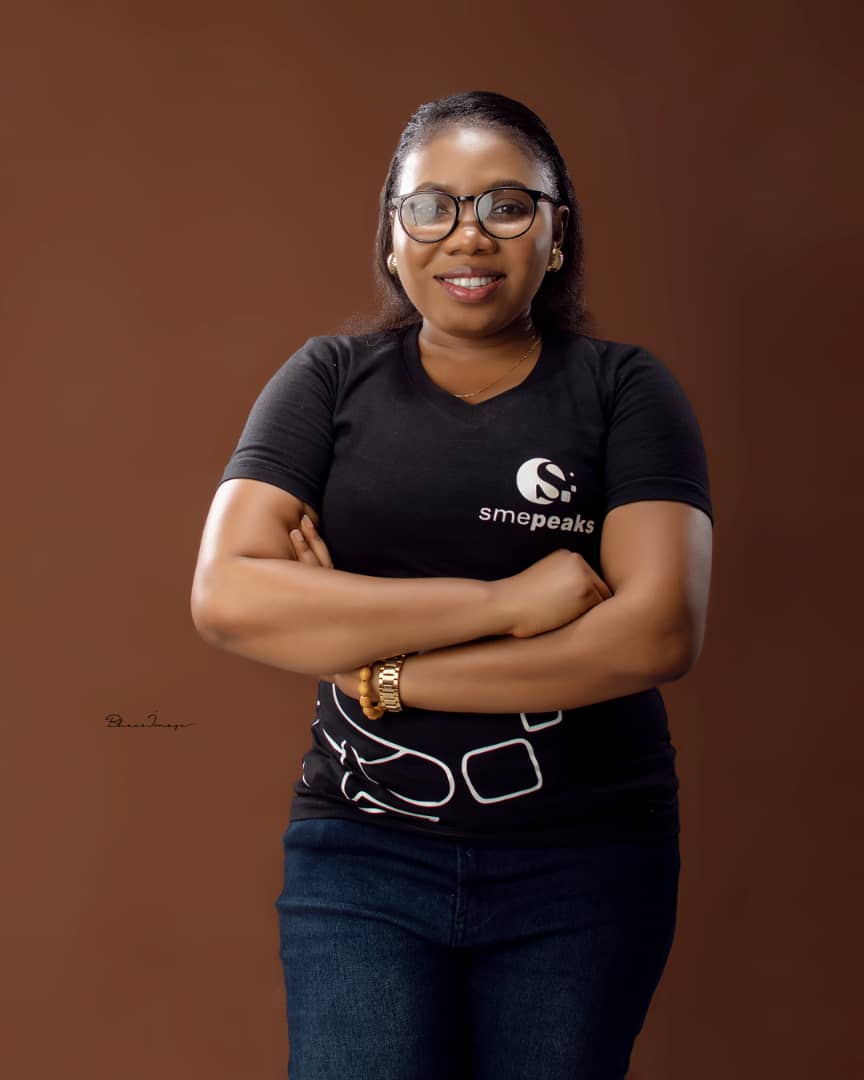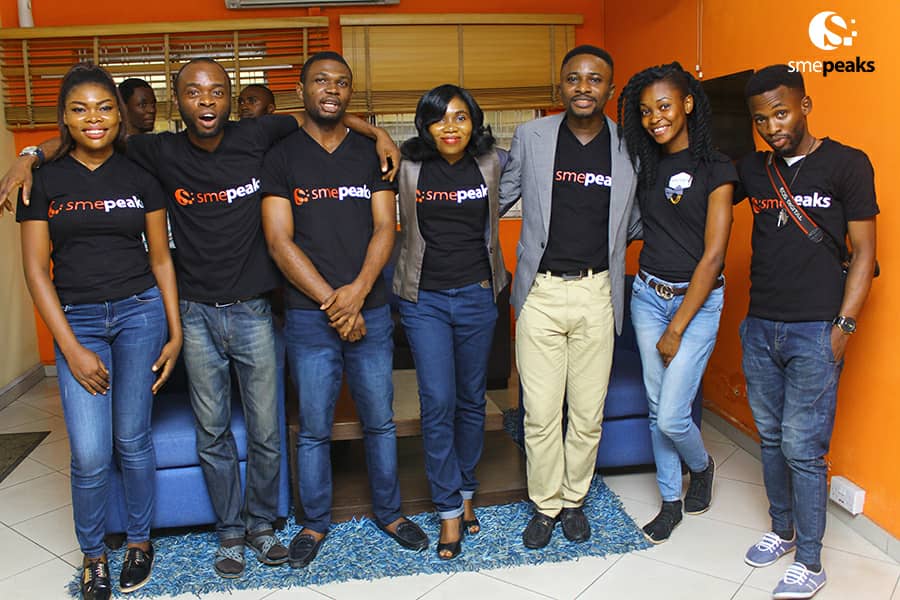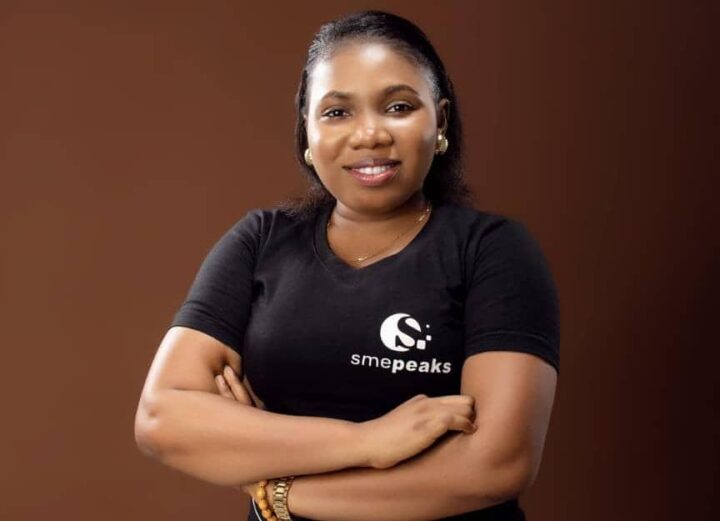Grace Akinosun, CEO of smepeaks, who studied science laboratory and petroleum chemicals, transitioned to the media industry by harnessing digital technologies to promote small businesses. In this Interview with TheCable’s Mary Ugbodaga, Akinosun shares her motivation for venturing into the media space, challenges SMEs face alongside her experience as a female entrepreneur.
TheCable: What was your drive in starting a business aimed at technology innovation for SMEs growth and performance?
Akinosun: I have always been passionate about how things work. I want to know how this computer works and I am very curious about creativity. When I was growing up I got a word for it, I said this looks interesting, this is not something I can see but I can feel the impact and then it draws me in. I came to Lagos in 2016, I was looking for the low hanging fruits when it comes to penetrating the tech industry. I consumed a lot of materials then I chanced on digital marketing. I felt that digital marketing was solving a lot of problems for businesses because it makes business go beyond buying based on familiarity to credibility so you don’t have to see people that you know one-on-one, you can sell to anyone from across the world. That’s what fascinated me. I’m always aiming for what’s next and how best to impact lives in the fastest possible time, like how do I reach the maximum people in the shortest time. I got a job in a real estate company as a secretary and graphics designer. Then one day at my job I decided that I want to reach people. How can I find a middle ground and I’m keen about tech, if I don’t do anything that has a tech angle to it, I would probably get frustrated.
I wanted to find out what’s the intersection between communication, tech and business. It just occurred to me that what if I start helping businesses accelerate whatever it is that they are doing using communication and storytelling. So I wanted to start a tech blog in 2016, with that I will be able to inform businesses on how best to position themselves but someone had already started want I wanted to do, they were doing tech news but were focused on startups. I looked up the company, founders and subscribed to everything. One day, I received a notification that they were looking for writers on different verticals or beats but I applied for ‘startup aficionado’ and I got the job. It (tech media firm) was a partial fulfilment to what I was looking for, it opened a new dimension which earned me the name ‘startup mama’ because the way I wrote helped them to make decisions about their businesses. When I was in the firm, the other part of me wanted me to reach more people and I felt that how can you give people the tech-enabled aspect of their business in such a way that I may not necessarily be using a mobile app or a blockchain technology but then I am able to leverage tech to balance my business. I started thinking, making research and SMEs came into the picture.
Advertisement
I went into the SMEDAN database to see what they have, what the government is doing and realized that there are a lot of businesses unreached. We have about 37 million SMEs in Nigeria and over 30 million of them are MSMEs so that’s like a huge market and most times they don’t scale because they don’t use tech tools. I thought about taking SMEs to the peak, what can bridge that, how can I take SMEs to the best possible height they can get to. I can use tech and information because it is very powerful and liberating. In 2018, I left the firm and started smepeaks but after I left, I worked with an international technology company that’s what even gave me a footing into the software domain. I learned how to bootstrap that is funding smepeaks from my pocket, income from working, from my expertise and freelancing to build the company.

TheCable: With smepeaks uniqueness in covering SMEs, what is one main feature you have discovered among small businesses in Nigeria and Africa?
Advertisement
Akinosun: They (SMEs) are hungry to know but they are incapacitated to do. They want to get to a point where they can raise series (funding) and if investors want to invest in you, they are looking for basic things like traction, customers, feedback, and a sustainable product. They start something and they don’t have those resources to build what is needed, to get to that level that investors get interested. They are hungry and you give them the information. The next thing is how do you go about driving this information? SMEs are established, what we help them do is to reach more businesses because most of them do business-to-business (B2B). Also, the appetite for risk is low. For you to succeed, you must’ve done quite a number of things that didn’t work. Failure is part of a learning process, it is like a child. A child falls down learning how to crawl or walk and injures him or herself but finally gets up and starts walking. That’s how the business is, it’s a baby and we treat a baby like it’s an adult, that’s a big stake.
Another thing is no patience. Some businesses need huge investment capital to plug into it. For instance, in starting a refrigerator logistics business, a refrigerator van could cost as high as N10 million compared to when you want to start trading online, you can just set up a blog or an online e-commerce platform or even start trading on Instagram and you don’t have to own your logistics, there are many companies you can partner with for delivery. That patience and discipline is not really there yet. And then Nigeria, it forces you to just want to do things because unemployment is soaring by the day and there is low infrastructure but you don’t have to go into it out of frustration, you will fail. Always look for the impact, that thing that will make you keep going. You just need to weigh the chances. On the positive part, they are dogged, they are always trying to explore, hungry for information and hungry to succeed.

TheCable: Is there anything that stands out for SMEs in Nigeria compared to small businesses in other African countries?
Advertisement
Akinosun: I think what stands out for SMEs in Nigeria is the market. There’s this low entry barrier into the market, it’s not so high. There are some industries that are well regulated, in those days it used to be oil and gas, maritime, medical, pharmaceutical industries and so on but an industry like logistics, just get your bike and start, it is as simple as that. There’re benefits to disorganized systems. The unpredictability, the ability not to predict what is going to happen next, could also be an advantage and disadvantage. There’s an open market, we don’t have a Q-A-Q system so I don’t know if my popcorn machine is polluting the environment, I don’t know if my logistic vehicles are emitting carbon monoxide that is dangerous, no one is doing all those checks. Because of that, it is so easy to quickly test what you want to test, see how the market responds to it. Give it (business) a timeline… I’m going to do this for the next four to six months or maximum a year, if it doesn’t work then there’s a chance it can’t work somewhere else but if it works here, it’s just to find a market similar that you can replicate anywhere in the world.
TheCable: In comparison to other business-major media firms in Nigeria, what are the elements that distinguish smespeaks from these companies?
Akinosun: At the beginning it wasn’t so clear, I won’t say it was 100 percent, all we just wanted to do was cater to the SME market. People discouraged me, I heard a million times “SMEs are the struggling ones, nobody will associate with SMEs”, I had a lot of suggestions (such as) business post, enterprise column but there’s something within me that said people will come to appreciate it one day and the market is there. We are very particular about giving information that helps to drive that tech inclusion that enables their businesses to get to that height where others now see them and reckon with them. SMEs are not the struggling ones, we like to call them the emerging ones. At the beginning no one really paid attention to us, it was a struggle but suddenly people started paying attention to us, people wanted to partner with us both on the local and international scale.
TheCable: Generally, what are the lessons you have learnt as a female business-owner in a male-dominated society?
Advertisement
Akinosun: The first one is stay true to yourself, what I mean is don’t try to impress. In the early days, when I thought we had to impress, we had to appear big like we got it covered, we started making more mistakes but when we stayed more true essence, it started making sense. If you stay true to yourself, you won’t second-guess your decisions and the things that you say, they will respect you for it. Second lesson is consistency. Again, there’s always this gender disparity, we have a society that is so patriarchal but one thing you have to understand is that when you are valuable, people delist that gender issue and just look for you, they just want that excellent.
Get known for something then you can diversify after that. First, you discover what it is, then you develop that thing; then display for people that need that kind of thing; and then you diversify. The third thing is having to prove yourself. If you are valuable no one will know unless you show it, make them see it by the impact you create. Lastly, it is not a competition. Yes, the business industry is competitive. Instead of worrying about what your competitors and others are doing, why not look within yourself to see how you can make things better or how you can do things differently.
Advertisement

TheCable: You have said consistency and growth is key to business success, as a startup company where do you see smepeaks in the next five years?
Advertisement
Akinosun: Five years is a very long time, I don’t like projecting for a very long time. I’m always more short term, if I say in the next three years I will just sum it up – impact. We want to reach more businesses, we want to quantify them. We want to reach at least 1000 businesses. We’ve reached more than that, we have a database of over 18,000 businesses but we want to be able to capture their stories, their process not just their success stories. We want to reach out beyond Lagos physically especially those states that people don’t really pay attention to. We want to be recognized as that media platform that is catering to emerging businesses and providing the necessary information to make them achieve that peak. In the next five years, we should have at least achieved some of these things, we should have that reputation.
TheCable: What advice would you like to put out to other aspiring female entrepreneurs?
Advertisement
Akinosun: Don’t go when you are not ready, take your time and don’t go into entrepreneurship as a last resort, it’s very important because it is a lonely journey. People don’t pay attention to you when you’re starting, people only pay attention to you after you’ve tried and tried. And at that point when you are struggling if you reach out to them they will probably snub you or they will think you don’t know what you are doing. That’s okay, it shows you are doing something but when you get there, they start coming back. You need to have that mental, emotional, physical intelligence and capacity to balance it. If you cannot spend at least one year trying to just try things even though you are not making money then get a day-job. You are not enslaved in a job, get a job that satisfies you. It doesn’t mean that it makes you fail or feel you are losing out on your life or makes you feel useless.
If you want to build a career, move with a company you believe in, a company whose passion aligns with yours. Jobs are a very good launchpad. I will also say don’t go into entrepreneurship without having that job experience, it will save you a lot of mistakes. You will learn how to manage your employees, customers, stakeholders and investors. You will understand that business is beyond buy and sell – make money, it’s a whole new life. And if you don’t have a background in all of these things, failure is imminent.





